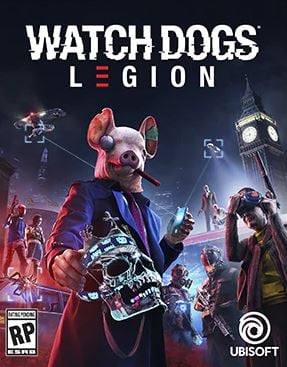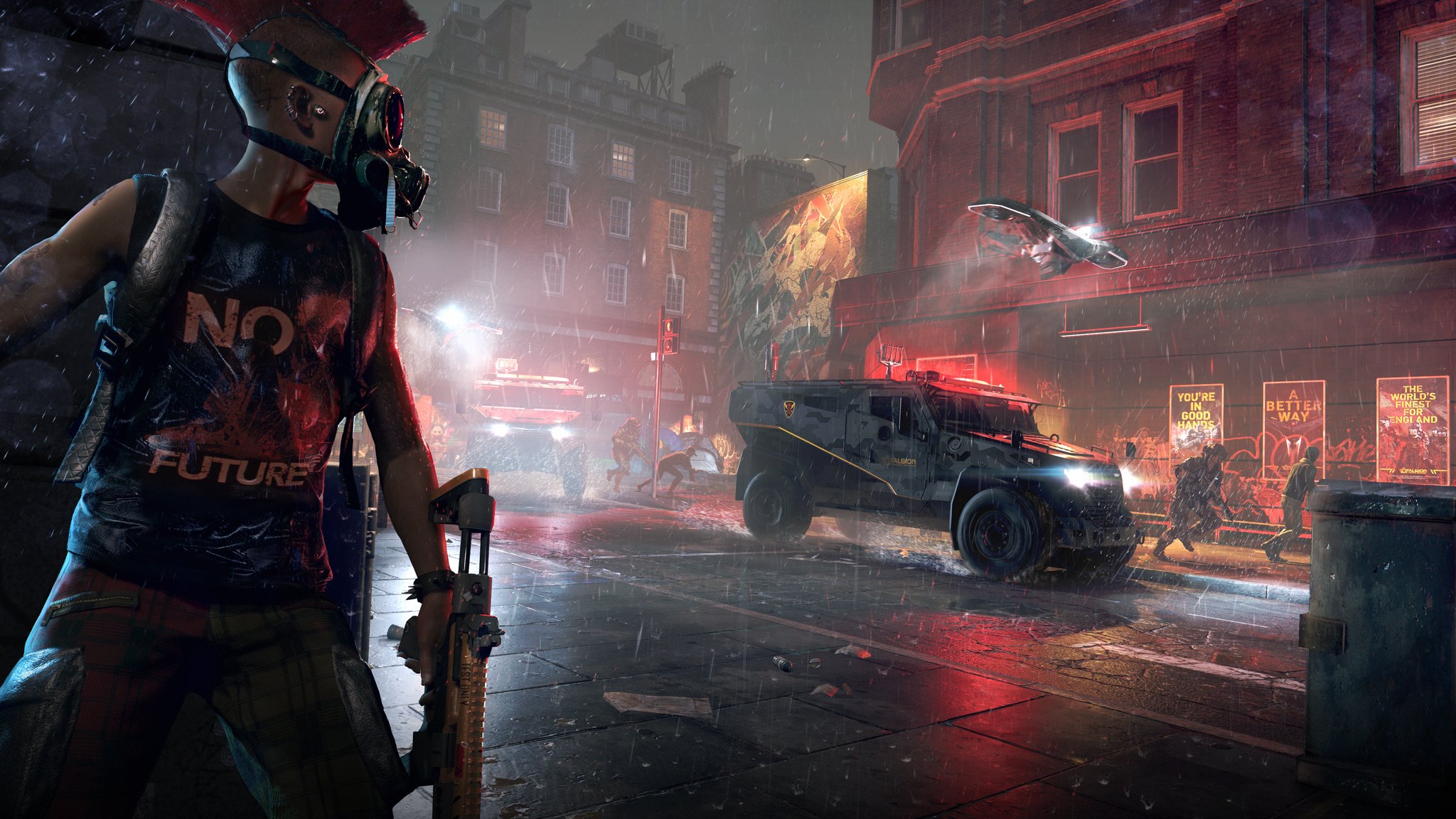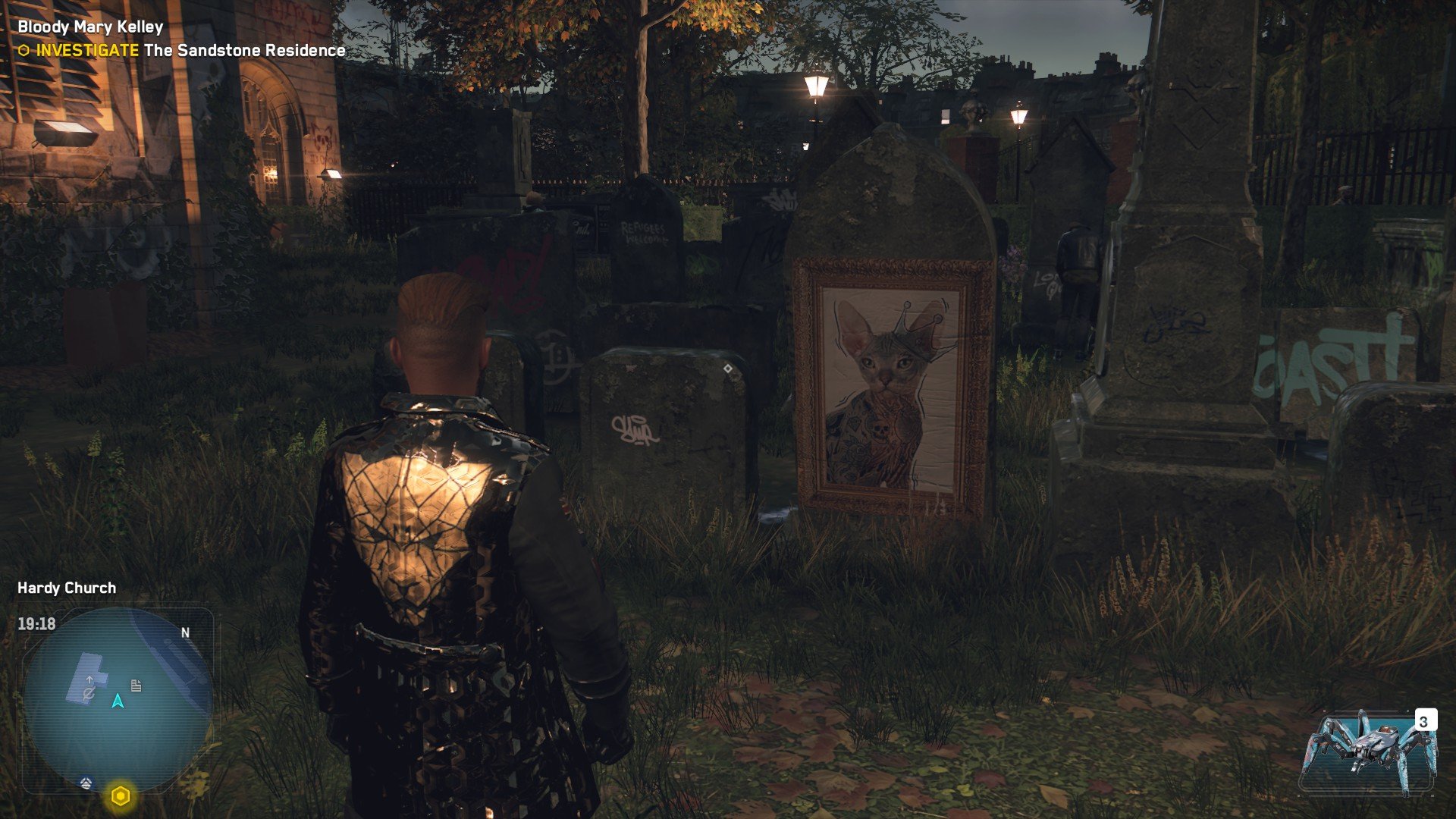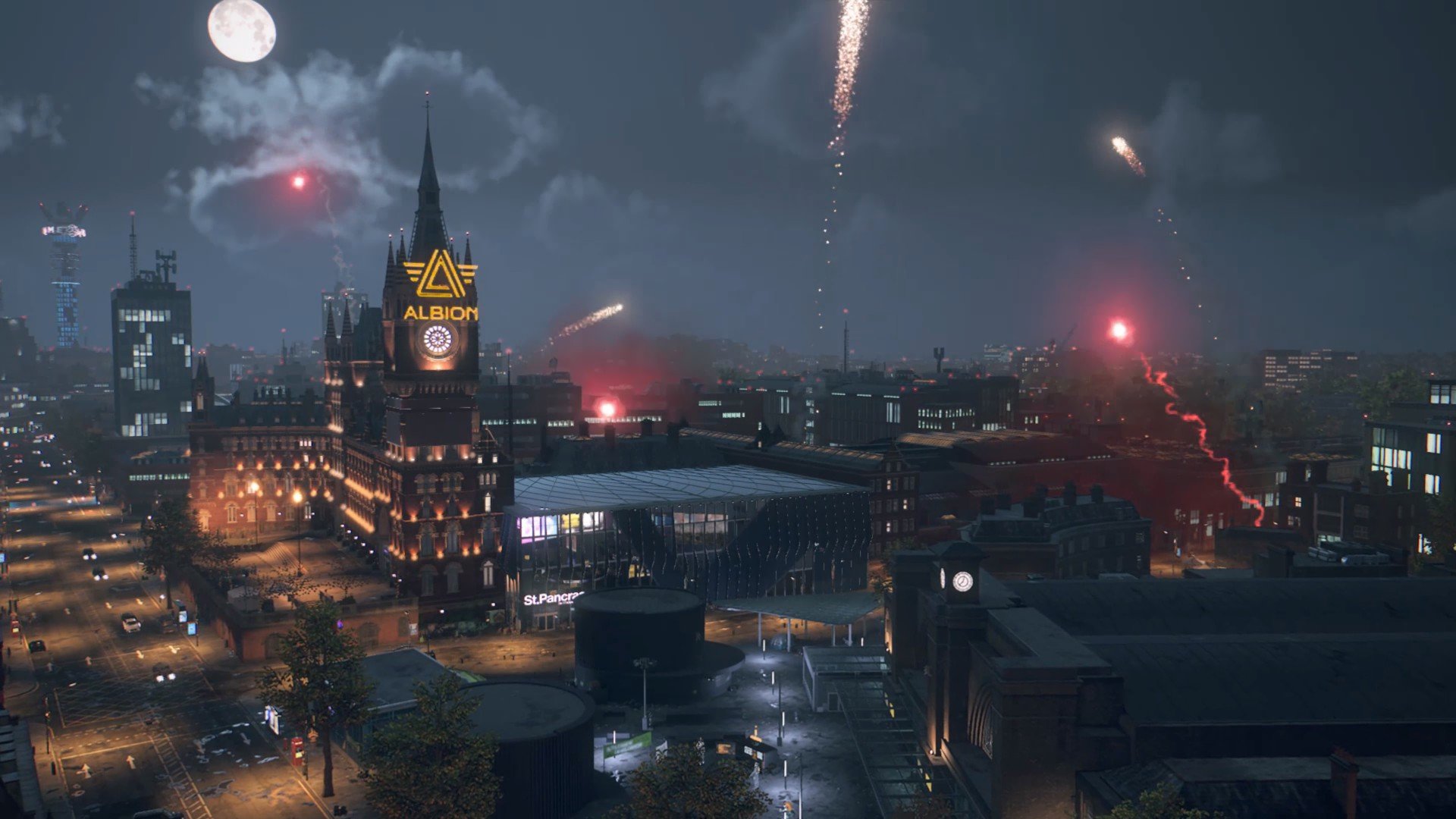Finally, a game where the politics are front and center.
Watch Dogs: Legion has been the underdog of Ubisoft's holiday and next-gen lineup, falling behind powerhouses like Assassin's Creed Valhalla and new titles like Immortals Fenyx Rising. That isn't to say Watch Dogs is an unpopular franchise — previous entries have sold quite well — but it doesn't have the same clout as a new Assassin's Creed game or even the new Far Cry game due out next year.
However, Watch Dogs: Legion manages to stand out among the holiday clutter. It's both Ubisoft's most ambitious title and the one least like other studio mainstays, and that's all good news for players.
The open-world game has marketed itself on a neat gimmick: it allows you to play anybody you encounter. Everybody you walk by on the street, from businesspeople to artists to old women and beekeepers, are playable. Recruit them to your team and use their skills to counteract fascism. Creative Director Clint Hocking, from Far Cry 2, was brought on to helm the project and has said in interviews how much work the team put in to making this system work. We've seen similar procedurally-generated systems before, but none are quite as robust or work as well as the one in Watch Dogs: Legion.
It's open in a way that a lot of its recent games have been, but it's also its most intensely political. The studio has put out games before that tackle political issues, but it's previously been mum about any intent on its part. Watch Dogs: Legion is unabashedly political, taking on Brexit and the rise of fascism across the world in a story that feels anti-cyberpunk. You can play as anybody, but beyond that, it feels like the studio's most human title to date.
Watch Dogs: Legion
Bottom line: Watch Dogs: Legion is a departure from the typical Ubisoft brand, and it's better for it. The play as anybody system just works, there's a lot to do, and it's unabashedly political in a way that feels important in 2020.
The Good
- "Play as Anyone" system just works
- Missions allow you to play however you want
- Story is unafraid to get dirty and political
- A lot of tools at your disposal
- Unclear how long the game is — there's so much to do
The Bad
- NPC system and missions can get repetitive
- Needs powerful system to run
From $60 at Microsoft (Xbox) $50 at Amazon (Xbox)
Watch Dogs: Legion's story is intensely political
In the beginning, DedSec are the bad guys. The tutorial level ends with multiple bombings and you've been blamed. The team is either in hiding or dead, but thanks to your trusty and snarky AI Bagley and a couple of members, you choose one character to start off the new DedSec and start recruiting from around the city. However, in the meantime London has fallen under the control of a privatized military force run by Albion, a tech company interested in AI and drones.
| Category | GameNameXXX |
|---|---|
| Title | Watch Dogs: Legion |
| Developer | Ubisoft |
| Publisher | Ubisoft |
| Genre | Open-world adventure |
| Minimum Requirements: CPU | Intel Core i5-4460 3.2 GHz, AMD Ryzen 5 1400 3.2 GHz |
| Minimum Requirements: GPU | NVIDIA GeForce GTX 970/GeForce GTX 1650 |
| Minimum Requirements: RAM | 8GB (dual-channel setup) |
| Minimum Requirements: OS | Windows 10 |
| Game Size | 50GB+ |
| Play Time | 20+ hours |
| Players | Singleplayer with mutliplayer mode |
| Launch Price | $60 |
The main storyline of the game involves taking down multiple organizations that had a hand in the bombings. They're all separate, but intertwined in small but meaningful ways. Most importantly, they're all thematically consistent. The organizations involved, all powerful in their own way, have their own motives, but all involve reducing humanhood and agency, especially of marginalized immigrant communities.
Watch Dogs: Legion is a post-Brexit game and heavily draws upon the xenophobia and classism that threw the U.K. into political and societal chaos (and out of the EU). Fears about immigrants taking jobs are on full display, covering ad space on bus stops and spewing from the mouths of pundits. Albion officers are stopping people on the street on just about every corner and checking their "legal" status. Even if they claim to be documented citizens, it doesn't work out well. They'll either be tackled and handcuffed or worse.
The fact this sort of oppression is happening in many countries as fascism rises across the world makes it feel less far-fetched. For example, you learn that one of the organizations, a criminal gang with deep connections, has been trafficking refugees and harvesting their organs. Your brain might initially deem this as the plot of a mad scientist, (the literal dehumanization of the most marginalized communities and turning them into profit is the perfect combination of Brexit-era anxieties and late stage capitalism). However, the government's potential for bodily harm is expansive, considering the U.S. has been giving hysterectomies to people at the border and separating families, as just one example. That's just the start of what it does to undocumented people it considers a danger to the country.
Beyond immigrant discrimination, the U.K. in Watch Dogs: Legion is dealing with issues concerning autonomous work. Albion and other tech companies are replacing workers with drones in multiple industries, putting people out of work but also blanketing the skies with moving machinery. The unemployed are protesting on multiple corners, and potential recruits want you to find out what happened to their jobs. The head of Albion believes that humans have limited potential and are just "bugs in the software." Another tech CEO believes that bodies are limiting. Humans are expendable. Bodies are expendable because in a fascist world, all that matters is power and those who can hold onto it.
Watch Dogs: Legion is immensely political and consistent in its messaging.
That's why the existence of DedSec in this world is both heroic and confusing. You're tasked with bringing down the organizations in power, specifically the ones that framed you for the bombings, but there's no plan after that though. Is the hope democracy will return? That anarchy will ensue? You can enact larger change in the main quests, but smaller things work as bandaids. You can interrupt and rescue a person being handcuffed, but they just get to run away. Even if you complete objectives to free boroughs (more on this later), Albion presence is still active.
Even more incongruous is the idea that everybody is playable. Is DedSec, and therefore the player, innocent in a world where bodies are disposable? Ubisoft gets around this a bit by imbuing each of the people with backstories, unique traits, and one of a few select personalities, but when the player might look at their team members as disposable, are they any better?
The U.K. of the near-future is violent and authoritarian. The brutality on display as you run around London is visceral enough, but there's background material that makes it feel even more real. Fake podcasts you can listen to talk about what's happening outside the scope of the main story. The country is blocked off from the rest of the world and can't get medicine or food in. This leads to people making deals with gangs to get treatment, which often leads to them becoming addicted. A peppering of world building goes a long way to ensuring this U.K. feels real and dangerous.
This is a huge step in the right direction for Ubisoft, a company where many executives have taken stances against politics in games or said it's up to the player to decide. Watch Dogs: Legion is immensely political and consistent in its messaging. It doesn't work on every level, especially once you start thinking about how the player interacts with the world and DedSec's role, but in its building of the narrative and the world, Watch Dogs manages to be speculative without straying too far from real-world issues.
On a more lighthearted note, the game also plays around with new forms of espionage versus old. You start off the game playing as Dalton, a James Bond-esque spy who's working for DedSec, and you can recruit other spies as you go. However, once you start getting into missions with the SIRS, you'll have to put away all of your high-tech gadgets and do some old-fashioned, face-to-face espionage. One mission has you seduce a company liaison to get her biometric data, but you have to do it correctly by figuring out her type. Otherwise, she'll turn you down. This goes deeper the more you play the main quest line, with the tension between cyber-intelligence and more traditional data gathering getting in the way of meaningful change.
Watch Dogs: Legion gameplay — "Play as Anyone" just works
The tiniest sampling of some unique Watch Dogs: Legion recruits.
The team on Watch Dogs: Legion has made it clear that its biggest draw is the gameplay, specifically with the innovative generation of its people. There are no main, playable protagonists like in the other Watch Dogs games. Instead, you can recruit anybody in London to join DedSec. Most of the people you walk by on the street have some trait or skill that can be valuable to you, so you can approach them, to a couple of favors, and if you're successful, they can join the squad.
The variety of gameplay make even the most basic missions feel fresh, although this has a limit.
You won't want to recruit most people you walk past — some don't have any discerning traits while others have negative opinions about DedSec — but there are a lot of kinds of people you can interact with. Whether you want young 20-somethings or a team of just the elderly, you have the freedom to do so (although worth noting that a lot of the elderly have low mobility or flatulence, ensuring they're tough to take on stealth missions). This is where strategy comes in. You can recruit as many people as you want, but the game wants you to have a variety of teammates on your roster. Having a drone expert on a mission can help with areas that are covered in drones, while a former hitman can take down enemies quickly. Some have more passive abilities. Doctors and paramedics reduce the time your teammates might be injured while lawyers reduce their time in prison. Having recruits with different job uniforms also increases the chance you can walk around an area undetected.
Multiple types of recruits means you can go about finishing missions in a variety of ways. Each task is a puzzle with varying degrees of difficulty. Sometimes it's a matter of opening an easily accessible door, but in others you have to get past a force of Albion officers or weave through a maze of cameras and vents to find what you're looking for. Some missions take minutes while others can take up to an hour depending on your skill level. You'll also have plenty of tools at your disposal to take on a mission however you like. Want to be invisible? You can unlock an AR cloak or use your trusty spiderbot to get around in vents. Unlock powerful guns if you want to face enemies head on. Access drones that can do a lot of the work for you, both hacking and in combat.
The variety of gameplay make even the most basic missions feel fresh, although this has a limit. Some of the simpler missions can feel monotonous after a while, and recruitment missions can also get repetitive. Plus, later missions in the main quest line force you into more combat-heavy situations, which seems to go against the hacker mindset just a bit.
The sheer amount of stuff you can do in the game counteracts this somewhat — I focused on the main quest line for this review, which took me around 20 hours to complete, but I constantly got distracted by side missions. You have the story and recruitment tasks, but you can also do borough missions that help to free areas of London from Albion. It's not a perfect solution to the systemic problems in-game, but you get access to Tech Points and specialized teammates. Random events also spring up. Your teammates might get kidnapped or Bagley will let you know of an interesting person to recruit.
Watch Dogs: Legion is a title you can get lost in as you just build your team. With the way the game is structured, along with post-launch content that includes new characters and missions, you can do it seemingly forever.
What you need to know about currency in Watch Dogs: Legion
There are two types of currency in the game, the first is ETO, which is cryptocurrency that works like money. You gain it by completing missions, hacking ATMs, or just stealing it from safes, and then use it to unlock cosmetics. Dress up your recruits however you see fit. Want them to look more preppy? There are clothing stores for that. Want them to be decked out in the Union Jack? That's also an option thanks to tourist stands around the game world. There are fun masks to unlock for missions, but there are also face masks that were added in response to the pandemic if you want to keep your players safe from COVID-19. You can also use ETO to unlock skins for your weapons.
The second is Tech Points. These are more scarce and can only be earned by completing missions or finding them around sometimes hidden areas. These are for upgrading your weapons and skills, so the game wants you to put in the effort and find them. You can use them to unlock new drones and weapons as well, but most important is upgrading your current gear.
Watch Dogs: Legion feels alive but not completely
Watch Dogs: Legion's open world feels full and alive at first glance. Cars will crash into each other without your provocation, which makes the roads feel busy, and if you hit them, people will get out of the car. What uniform you're wearing can impact how people on the street interact with you. If you're wearing a police uniform, they'll be polite even if you bump into them. If you're donning an Albion uniform, however, they'll call you a "fascist pig." Hocking noted in interviews that the characters will also be impacted by events in the game, so if a romantic partner dies, they'll mourn in a cemetery instead of going about their daily routine. This is mostly invisible to players, although doing deep profiles and stalking certain NPCs can reveal these intricacies.
However, if you stop and look around you'll notice where the edges are. You can run over people with your vehicle and not face any repercussions. No ambulances are called and the police don't show up.
The lack of consequences can be seen most clearly with your main resource: your team. Stealth and patience are key in completing missions because enemies can call reinforcements, which can overwhelm you and stop your progress dead in its tracks — although not literally. Only some characters can die (it's one of the main traits your teammates can have), so if you're injured too much or caught during a mission, you'll be arrested, forcing you to choose another teammate and start over. The member is then out of commission until they're released from prison.
It's a neat system to ensure you can keep your team without the risk of perma-death, but it breaks down easily. If you get a lawyer or barrister on your team, you can drastically reduce the time your teammates spend in jail. If you have a doctor, their injury time is also decreased. Even the toughest missions aren't insurmountable when all you have to do is wait for a few minutes.
There were some tech issues
Also worth noting are the endless tech issues I encountered while playing. I reviewed the game on PC, although Ubisoft recommends playing on console, specifically the Xbox One X or the PS4 Pro. There is a Day One patch for the game, and reviewers were given that version for review.
My PC doesn't have the highest-tier specs, but it gets the job done for most games. I was able to play the game on medium to high graphical settings, but regardless of where I put the slider, the game still crashed frequently. Players will need to check the minimum and recommend specs for the game. While I met all of the minimum requirements and even most of the recommended ones, I still experienced crashes. This meant I had to replay critical missions, although luckily the game does have a decent autosave feature.
Your experience may differ here, but regardless, you'll need either a powerful console or top-of-the-line PC to get the most out of the game.
Bottom line — Should you play Watch Dogs: Legion?
Ubisoft had a tough year. Beyond delaying most of its games in late 2019 following the disappointment of Ghost Recon Breakpoint, it's been at the center of news thanks to multiple reports of sexual harassment and workplace abuse. Multiple executives have been suspended or left the company. All of the allegations have put playing Ubisoft games, both old and new, into perspective, and I'd be lying if I didn't comment on how it lingered in the back of mind while playing Watch Dogs: Legion. We can't speculate on what the production was like on Legion, and Hocking has gone on the record to say that the whole situation has been "very demoralizing and very difficult to deal with."
That all being said, Watch Dogs: Legion is a unique experience that mostly lives up to the potential set out by its team. There are holes in its demeanor that expose where the technology and effort hit its limit, but the game still manages to support its ambition. It also helps that the game is the studio's most openly political to date, finally breaking away from many of the executives' strange apolitical stances.
Watch Dogs: Legion is an enjoyable open-world romp where you can wander around London, talking to people, recruiting them for your mission, and exposing fascism. However, it's also a story about people's capabilities to be inhuman. Technology is at the center of the game, both in it being the main driver of the antagonists but also in how it can be used to bring people together and create some change. DedSec aren't the perfect heroes and their implementation here isn't the cleanest, but the message is front and center, which shows how far a series and a studio can come.
Watch Dogs: Legion releases on Oct. 29, 2020 for PC, PS4, Xbox One, and Stadia. It'll also be available on the Xbox Series X and PS5.
Watch Dogs: Legion
Bottom line: Watch Dogs: Legion lives up to a lot of its promises. The NPC system works well and the gameplay is seemingly endless, but more importantly, it has a story to tell.












0 comments:
Post a Comment